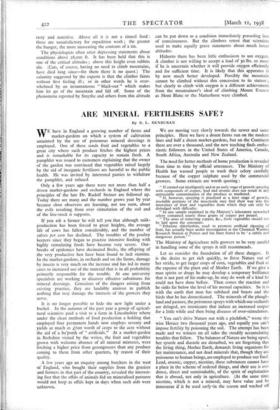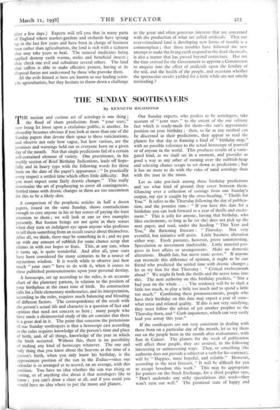ARE MINERAL FERTILISERS SAFE ?
By S. L. BENSUSAN
WE have in England a growing number of farms and market-gardens on which a system of cultivation untainted by the use of poisonous mineral dressings is employed. One of these sends fruit and vegetables to a great city where such produce fetches the highest prices and is remarkable for its capacity to remain fresh. A pamphlet was issued to customers explaining that the owner of the garden was convinced that vegetables raised largely by the aid of inorganic fertilisers are harmful to the public health. He was invited by interested parties to withdraw the pamphlet, and refused.
Only a few years ago there were not more than half a dozen market-gardens and orchards in England where the principles of the late Dr. Rudolf Steiner are followed up. Today there are many. and the number grows year by year because close observers are learning, not too soon, about the evils resulting from over stimulation of the soil and of the live-stock it supports.
If you ask a farmer he will tell you that although milk- production has been forced to great heights, the average life of cows has fallen considerably, and the number of calves per cow has declined. The troubles of the poultry keepers since they began to practise intensive feeding with highly stimulating foods have become very severe. Out- breaks of epidemics have decimated flocks, the offspring of the very productive hen have been found to lack stamina. In the market-gardens, in orchards and on the farms, damage by insects is very much on the increase and has led in many cases to increased use of the material that is in all probability primarily responsible for the trouble. At one university specialists are working to discover effective substitutes for mineral dressings. Conscious of the dangers arising from existing practice, they are laudably anxious to publish nothing that may damage the interests of the growers they serve.
It is no longer possible to hide the new light under a bushel. In the autumn of the past year a group of agricul- tural scientists paid a visit to a farm in Lincolnshire where under the clean methods of food production a holding that employed four permanent hands now employs seventy and yields as much as i600 worth of crops to the acre without the aid of a ha'porth of " artificials." At a market-garden in Berkshire visited by the writer, the fruit and vegetables grown with welcome absence of all mineral mixtures, were fetching a higher price from greengrocers than any produce coming to them from other quarters, by reason of their quality.
A few years ago an enquiry among butchers in the west of England, who bought their supplies from the graziers and farmers in that part of the country, revealed the interest- ing fact that the offals of animals fed on mineralised pastures would not keep as offals kept in days when such aids were unknown. We are moving very slowly towards the newer and saner principles. Here we have a dozen farms run on the modern lines and half a dozen market-gardens, but on the Continent there are over a thousand, and the new teaching finds enthu- siastic followers in the United States of America, Canada, South Africa, Australia and New Zealand.
The need for better methods of home production is revealed from time to time by official utterances. The Ministry of Health has warned people to wash their celery carefully because of the copper sulphate used by the commercial growers. Some extracts are worth quoting :
" If carried out intelligently and at an early stage of growth spraying with compounds of copper, lead and arsenic does not result in any appreciable contamination of the produce as marketed.
If, however, spraying is practised at a later stage of growth, insoluble portions of the insecticide may find their way into the interstices of fruit and vegetables from which they can only be dislodged with difficulty.
" In one sample examined in the Ministry's laboratory unwashed celery contained nearly three grains of copper per pound.
" The onus of removing copper, &c., from vegetables should not be laid upon the consumer.
" Ethylene chlorhydrin, used to promote artificial ripening of fruit, has actually been under investigation at the Chemical Warfare Research Station at Porton and has been found to be ' a subtle and dangerous poison.' " The Ministry of Agriculture tells growers to be very careful in handling some of the sprays it still recommends.
Let us consider the foundation of all these dangers. It is the desire to get rich quickly, to force Nature out of her stride, to get larger crops of corn, vegetables and fruit at the expense of the plant and of Mother Earth. If we give a man spirits or drugs he may develop a temporary brilliance that is not part of his make-up, he may do work of a kind he could not have done before. Then comes the reaction and he sinks far below the level of his normal capacities. So it is with the earth that man has subdued and beasts and the birds that he has domesticated. The minerals of the plough- land and pasture, the poisonous sprays with which our orchards are deluged, are intoxicants that induce an increased output for a little while and then bring diseases of over-stimulation.
" You can't drive Nature out with a pitchfork," wrote the wise Horace two thousand years ago, and equally you can't impose fertility by poisoning the soil. The attempt has been made and we witness on all sides the steadily accumulating troubles that follow. The balances of Nature are being upset, her systole and diastole are disturbed, we are forgetting that the living thing, Mother Earth, demands living organisms for her maintenance, and not dead minerals that, though they are poisonous to human beings, are employed to produce our food. Lead, arsenic, copper, nicotine, these substances cannot have a place in the scheme of ordered things, and their use is evi- dence, direct and unmistakable, of the spirit of exploitation that is abroad, not only in agriculture. (At the same time nicotine, which is not a mineral, may have value and be innocuous if it be used early -in the season and washed off after a few days.) Experts will tell you that in many parts of England where market-gardens and orchards have sprung up in the last few years and have been in charge of business men rather than agriculturists, the land is sick with a sickness that may take years to heal. The mineral medicines being applied destroy earth worms, moles and beneficial insects ; they check one evil and substitute several others. The land that suffers is able to make effective protest, having at its disposal forces not understood by those who provoke them.
All the evils hinted at here are known to our leading scien- tific agriculturists, but they hesitate to throw down a challenge to the great and often generous interests that are concerned with the production of what are called artificials. That our over-stimulated land is developing new forms of trouble is a commonplace ; that these troubles have followed the new attempt to make the living earth respond to the dead chemicals, is also a matter that has passed beyond conjecture. Has not the time arrived for the Government to appoint a Commission to enquire into the effect of artificials upon the fertility of the soil, and the health of the people, and ascertain whether the spectacular results yielded for a little while are not utterly misleading ?











































 Previous page
Previous page